The top issues impacting student learning outcomes
In 2024, teachers shared that the biggest challenges impacting student learning outcomes are:
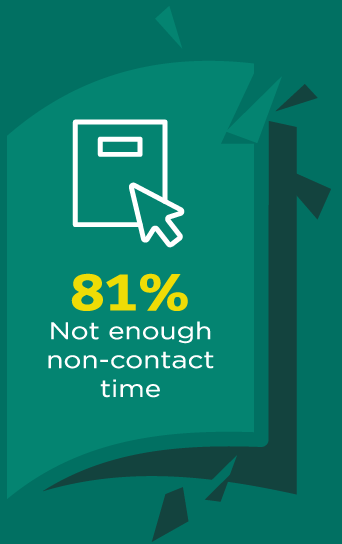
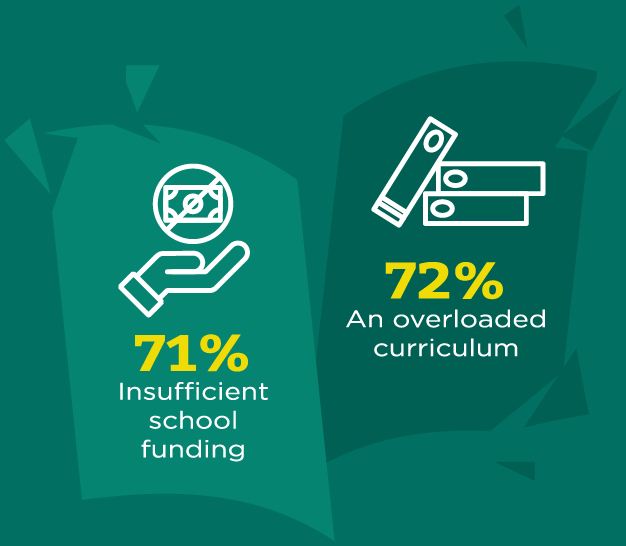
Mainstream state responses only.
The picture is complex, and other challenges exist, like insufficient support for students with special education needs and disabilities (SEND).
A lack of science technicians and specialist science teachers continues to be of concern in some nations.
In your own teaching experience, which (if any) of these factors have had a detrimental effect on student learning outcomes in the last year (since March 2023)? Please select all that apply.
↓Explore the biggest challenges impacting student learning outcomes in more detail below
1. Not enough non-contact time
Over three-quarters of teachers told us that their lack of non-contact time was detrimental to student learning outcomes. This was the case across all nations and school types. But it was cited more frequently by teachers in mainstream state secondary schools than in private/independent schools (81% versus 62%).
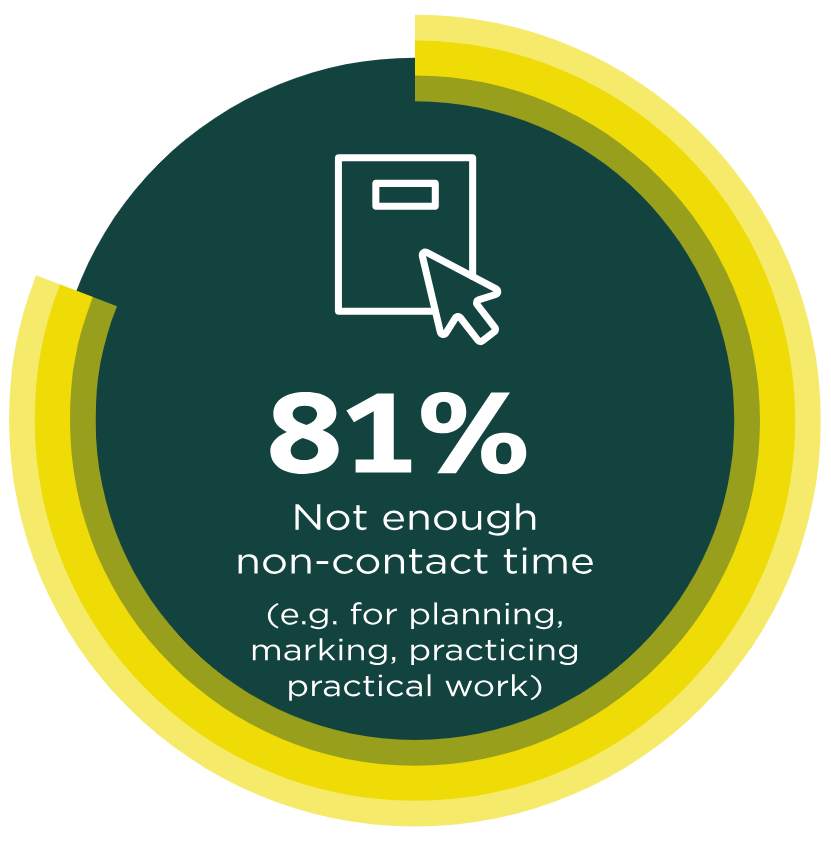
![]()
[Teachers having] more non-contact time. This way they can get to know their classes better and prep for them. At present science teachers can have 10 plus different science classes – compare that with a subject like history where they have far fewer and have far less varied content to deliver.
Table: In your own teaching experience, which (if any) of these factors have had a detrimental effect on student learning outcomes in the last year (since March 2023)?
Not enough non-contact time (e.g. for planning, marking, practising practical work)
Not enough non-contact time – download the full data set for more on this
2. An overloaded curriculum
In 2024, teachers reported that an overloaded science curriculum had a detrimental effect on their students. 72% of respondents from mainstream state secondary schools across all nations cited this as an issue.
Teachers told us about having to rush through topics, a curriculum that lacks relevance, and no time to promote a love of science.
We share teachers' concerns about the impact on students. An overloaded curriculum may mean students:
- gain only a superficial understanding of scientific concepts
- become disengaged, feeling that chemistry isn’t something they can relate to or enjoy
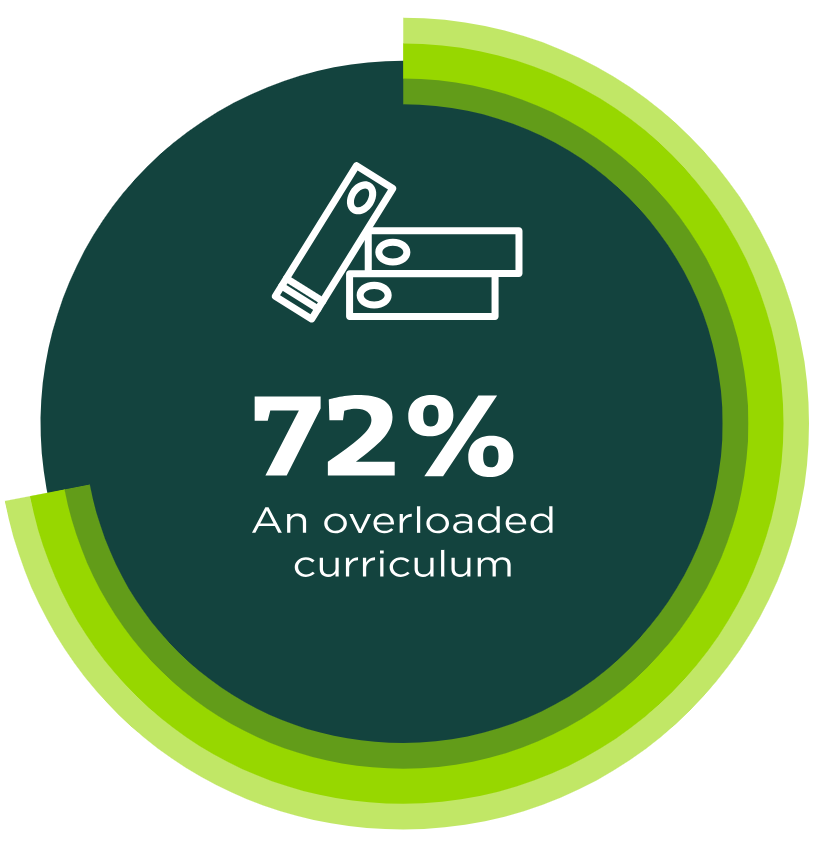
![]()
It feels like the curriculum is so large that we do not get the necessary time to promote the love of science – especially with combined science students at GCSE.
It can be challenging to balance the requirement to cover and teach content with allowing students' interests and curiosity. Too often, we have to skip interesting topics or questions because there isn't the time available.
I used to feel that I could make a big impact, but the current content/knowledge-led curriculum lacks creativity, and I feel like I am teaching children who can repeat scientific facts, but I am not developing proper scientists as there is no time to teach the skills. It's all knowledge, knowledge, knowledge.
An overloaded curriculum – download the full data set for more on this
Related findings from previous surveys
- Teachers recommend curriculum changes to make chemistry more relevant and accessible (2023).
- Too much content to teach within the time available was a major challenge across all the sciences at KS4 (2022).
- Teachers said that changes to the curriculum and assessment would have the biggest positive impact on science education (2022).
- In our 2021 Green Shoots report, 57% of educators surveyed said they don’t have enough time to teach content in a sustainability context.
3. Insufficient school funding
Teachers told us that insufficient funding is having a detrimental effect on student learning outcomes. In 2023 and 2024 teachers were quoted saying that practical work, in particular, suffers. Stretched budgets mean that many science teachers cannot afford to run practical lessons due to the cost of equipment, consumables and chemicals.
Practical chemistry is part of an engaging, inspiring and relevant chemistry education. Teachers and chemists alike attest to the transformative power of practical lessons in bringing chemistry to life.
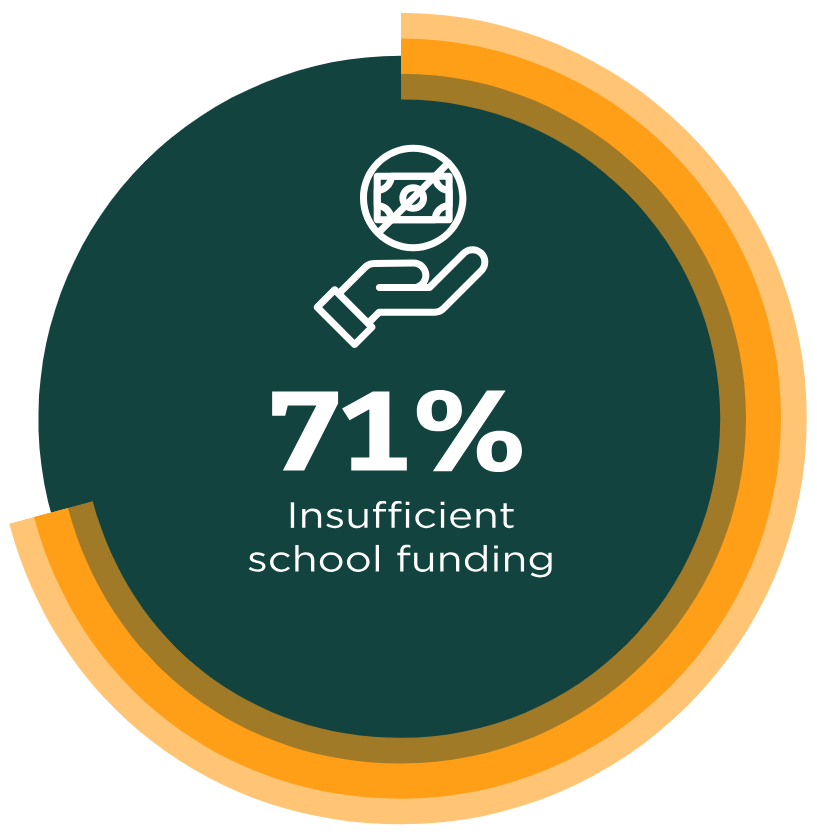
Mainstream state secondary responses only.
![]()
Funding cuts to schools mean budget is stretched, and we currently do not have all practical equipment and technicians that we need … ]
Students love practicals overall, but resources and funding isn't adequate to do fun or interesting practicals.
Insufficient school funding – download the full data set for more on this
Related findings from previous surveys
- In the 2023 survey, teachers told us that underfunding is having a negative impact on science teaching and learning.
Campaigning for change
- We’re asking the UK government to ensure a world-class chemistry education for all with a relevant and adequately resourced curriculum, accessible routes and equitable pathways, and an empowered expert workforce.
- The elements of a successful chemistry curriculum and Green Shoots: A sustainable chemistry curriculum for a sustainable planet formed the basis of our consultation response on the Leaving Certificate in Ireland. These two reports have also informed our advice to Qualifications Wales in our meetings about Welsh GCSE reform.
Your thoughts on student behaviour
The 2024 Science Teaching Survey didn’t include questions about student behaviour. However, a quarter of teachers reported (via the open-ended responses) that poor student behaviour negatively affected learning outcomes and their impact as a teacher.
![]()
![]()
Poor behaviour of pupils has the greatest impact on their attitude to learning.
Student behaviour has deteriorated hugely and poor attitude to learning often impacts the classroom experience for lower school (KS3 and KS4). KS5 students, in contrast, are highly motivated. The school has insufficient support staff to help deal with incidents of poor behaviour so that teachers can get on with the job of teaching.
The behaviour in schools has been declining steadily, and post-COVID, there seems to be a real change in social expectations and behaviours of students. This is something I've seen in three separate schools now. That being said, I do still get moments where kids wonder and amaze at the universe around us, from the large scale to the small scale.
Related findings from previous surveys
- 46% of teachers planning to leave their current school by the end of the 24/25 academic year cited poor student behaviour as the main reason (Understaffing exacerbates pressure on teachers, 2023 survey).
Essential resources for classroom management
- New for 2025 – ‘Effective practical work’ course. The online course offers four sessions over a term, focusing on classroom management during practical activities. The in-person course combines hands-on practice with classroom management strategies to enhance the effectiveness of your practical lessons. Find out more in the teacher professional development section of our Education website.
- Behaviour management articles – written by teachers for teachers, you’ll find tips and strategies for dealing with disruptive behaviour.



